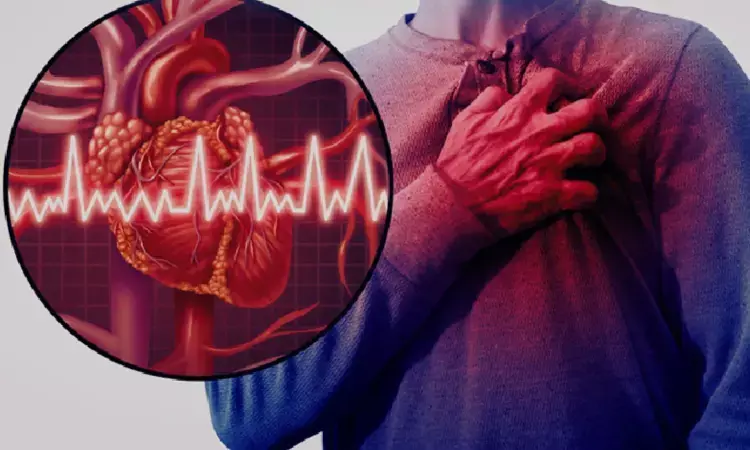- Home
- Medical news & Guidelines
- Anesthesiology
- Cardiology and CTVS
- Critical Care
- Dentistry
- Dermatology
- Diabetes and Endocrinology
- ENT
- Gastroenterology
- Medicine
- Nephrology
- Neurology
- Obstretics-Gynaecology
- Oncology
- Ophthalmology
- Orthopaedics
- Pediatrics-Neonatology
- Psychiatry
- Pulmonology
- Radiology
- Surgery
- Urology
- Laboratory Medicine
- Diet
- Nursing
- Paramedical
- Physiotherapy
- Health news
- Fact Check
- Bone Health Fact Check
- Brain Health Fact Check
- Cancer Related Fact Check
- Child Care Fact Check
- Dental and oral health fact check
- Diabetes and metabolic health fact check
- Diet and Nutrition Fact Check
- Eye and ENT Care Fact Check
- Fitness fact check
- Gut health fact check
- Heart health fact check
- Kidney health fact check
- Medical education fact check
- Men's health fact check
- Respiratory fact check
- Skin and hair care fact check
- Vaccine and Immunization fact check
- Women's health fact check
- AYUSH
- State News
- Andaman and Nicobar Islands
- Andhra Pradesh
- Arunachal Pradesh
- Assam
- Bihar
- Chandigarh
- Chattisgarh
- Dadra and Nagar Haveli
- Daman and Diu
- Delhi
- Goa
- Gujarat
- Haryana
- Himachal Pradesh
- Jammu & Kashmir
- Jharkhand
- Karnataka
- Kerala
- Ladakh
- Lakshadweep
- Madhya Pradesh
- Maharashtra
- Manipur
- Meghalaya
- Mizoram
- Nagaland
- Odisha
- Puducherry
- Punjab
- Rajasthan
- Sikkim
- Tamil Nadu
- Telangana
- Tripura
- Uttar Pradesh
- Uttrakhand
- West Bengal
- Medical Education
- Industry
High prevalence and persistence of vitamin D deficiency revealed over time in patients with acute MI: Study

Italy: A recent study published in Nutrition, Metabolism and Cardiovascular Diseases has shed light on the persistence of vitamin D deficiency among Italian patients with acute myocardial infarction (AMI).
The researchers revealed a high prevalence and persistence of vitamin D deficiency (Hypovitaminosis D) in AMI patients despite a trend towards increasing 25(OH)D concentrations over the years. The COVID-19 pandemic and lockdowns did not affect vitamin D levels.
Previous studies have shown vitamin D deficiency is a common cardiovascular (CV) risk factor linked with atherosclerosis development. Aneta Aleksova, University of Trieste in Trieste, Italy, and colleagues evaluated changes in 25(OH)D concentrations in 1510 patients with acute myocardial infarction over a long observation period, including the COVID-19 pandemic.
Patients were divided into four groups according to the year of enrolment, group 1 (2009-2010), group 2 (2014-2016), group 3 (2017-2019), and group 4 (2020-2022).
The key findings of the study were as follows:
· The median 25(OH)D concentration in the overall cohort was 17.15 ng/mL. The median plasma concentrations of 25(OH)D for groups 1, 2, 3, and 4 were 14.45 ng/mL, 17.3 ng/mL, 18.95 ng/mL and 19.05 ng/mL, respectively.
· Although 25(OH)D levels increased over the years, the prevalence of vitamin D deficiency remained high in each group (68.4%, 61.4%, 53.8%, and 52%, respectively).
· Hypovitaminosis D was predicted by the season influence (OR:2.03), higher body mass index (OR:1.25), smoking (OR:1.47), diabetes mellitus (OR:1.54), higher triglycerides levels (OR:1.02), older age (OR:1.07), and female gender (OR:1.3).
· After multivariable adjustment, vitamin D≤20 ng/mL was an independent predictor of mortality.
The findings showed that Hypovitaminosis D is highly prevalent and persistent over time in patients with AMI despite increasing vitamin D levels. The frequent lockdowns did not reduce 25(OH)D levels in the fourth group (2020-2022).
Vitamin D deficiency is highly prevalent and persistent in patients with AMI despite a trend towards increasing 25(OH)D concentrations over the years. The frequent lockdowns did not reduce the levels of 25(OH)D in the fourth group (2020-2022). However, the lowest incidence of hypovitaminosis D was observed between 2020 and 2022.
"Low levels of 25(OH)D are an independent predictor of mortality," the researchers concluded.
Reference:
DOI: https://doi.org/10.1016/j.numecd.2024.02.007
Dr Kamal Kant Kohli-MBBS, DTCD- a chest specialist with more than 30 years of practice and a flair for writing clinical articles, Dr Kamal Kant Kohli joined Medical Dialogues as a Chief Editor of Medical News. Besides writing articles, as an editor, he proofreads and verifies all the medical content published on Medical Dialogues including those coming from journals, studies,medical conferences,guidelines etc. Email: drkohli@medicaldialogues.in. Contact no. 011-43720751


